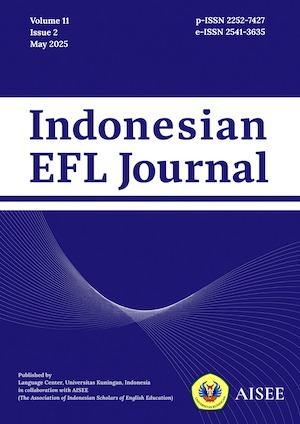INVESTIGATING EFL STUDENTS’ PERCEPTION AND PRACTICE OF ONLINE PEER ASSESSMENT IN THE SCHOOL CONTEXT
Abstract
Recently, there has been an enhancement in the utilization of online peer assessment in the classroom and other language learning settings. This mixed-method study investigated EFL students' perceptions and practices of implementing online peer assessment. 66 senior and junior high school students were asked to fill out the closed-ended questionnaire and 15 students consented to fill the open-ended questionnaire. The survey data were analyzed using the Rasch Rating Scale Model with the assistance of Winsteps software; while the open-ended questionnaires were analyzed using thematic analysis. Results indicated that students showed positive and negative attitudes on practicing online peer assessment, perceived fairness of peer comments, and described personal learning experiences. Besides, in perceiving affective feedback, students showed a positive attitude toward online peer assessment; meanwhile, they had a negative attitude toward the system as they faced difficulty dealing with technical problems. These findings provide significant evidence of how the EFL students perceived the implementation of online peer assessment in the learning process.Keywords: Assessment; online peer assessment, students’ perception, EFL students.References
Adachi, C., Hong-Meng Tai, J., & Dawson, P. (2018). Academics’ perceptions of the benefits and challenges of self and peer assessment in higher education. Assessment and Evaluation in Higher Education, 43(2), 294–306. https://doi.org/10.1080/02602938.2017.1339775
Bambang Sumintono., & Wahyu Widhiarso. (2013). Aplikasi model rasch : untuk penelitian ilmu-ilmu sosial. Trim Komunikata Publishing House.
Braun, V., & Clarke, V. (2006). Using thematic analysis in psychology. Qualitative Research in Psychology, 3(2), 77–101. https://doi.org/10.1191/1478088706qp063oa
Cao, S., Zhou, S., Luo, Y., Wang, T., Zhou, T., & Xu, Y. (2022). A review of the ESL/EFL learners’ gains from online peer feedback on English writing. In Frontiers in Psychology (Vol. 13). Frontiers Media S.A. https://doi.org/10.3389/fpsyg.2022.1035803
Carvalho, A. (2013). Students’ perceptions of fairness in peer assessment: evidence from a problem-based learning course. Teaching in Higher Education, 18(5), 491–505. https://doi.org/10.1080/13562517.2012.753051
Cheng, K. H., Liang, J. C., & Tsai, C. C. (2015). Examining the role of feedback messages in undergraduate students’ writing performance during an online peer assessment activity. Internet and Higher Education, 25, 78–84. https://doi.org/10.1016/j.iheduc.2015.02.001
Chien, S. Y., Hwang, G. J., & Jong, M. S. Y. (2020). Effects of peer assessment within the context of spherical video-based virtual reality on EFL students’ English-Speaking performance and learning perceptions. Computers and Education, 146. https://doi.org/10.1016/j.compedu.2019.103751
Double, K. S., McGrane, J. A., & Hopfenbeck, T. N. (2020). The impact of peer assessment on academic performance: A meta-analysis of control group studies. Educational Psychology Review, 32(2), 481–509. https://doi.org/10.1007/s10648-019-09510-3
Jones, I., & Wheadon, C. (2015). Peer assessment using comparative and absolute judgement. Studies in Educational Evaluation, 47, 93–101. https://doi.org/10.1016/j.stueduc.2015.09.004
Kaufman, J. H., & Schunn, C. D. (2011). Students’ perceptions about peer assessment for writing: Their origin and impact on revision work. Instructional Science, 39(3), 387–406. https://doi.org/10.1007/s11251-010-9133-6
Li, H., Xiong, Y., Hunter, C. V., Guo, X., & Tywoniw, R. (2020). Does peer assessment promote student learning? A meta-analysis. Assessment and Evaluation in Higher Education, 45(2), 193–211. https://doi.org/10.1080/02602938.2019.1620679
Lin, G. Y. (2018). Anonymous versus identified peer assessment via a Facebook-based learning application: Effects on quality of peer feedback, perceived learning, perceived fairness, and attitude toward the system. Computers and Education, 116, 81–92. https://doi.org/10.1016/j.compedu.2017.08.010
Lu, J., & Law, N. (2012). Online peer assessment: Effects of cognitive and affective feedback. Instructional Science, 40(2), 257–275. https://doi.org/10.1007/s11251-011-9177-2
Shen, B., Bai, B., & Xue, W. (2020). The effects of peer assessment on learner autonomy: An empirical study in a Chinese college English writing class. Studies in Educational Evaluation, 64. https://doi.org/10.1016/j.stueduc.2019.100821
van den Bos, A. H., & Tan, E. (2019). Effects of anonymity on online peer review in second-language writing. Computers and Education, 142. https://doi.org/10.1016/j.compedu.2019.103638
Wallace, M. P., & Qin, C. Y. (2021). Language classroom assessment fairness: Perceptions from students. LEARN Journal: Language Education and Acquisition Research Network, 14(1), 492–521. https://so04.tci-thaijo.org/index.php/LEARN/index
Wen, M. L., & Tsai, C. C. (2006). University students’ perceptions of and attitudes toward (online) peer assessment. Higher Education, 51(1), 27–44. https://doi.org/10.1007/s10734-004-6375-8
Zou, Y., Schunn, C. D., Wang, Y., & Zhang, F. (2018). Student attitudes that predict participation in peer assessment. Assessment and Evaluation in Higher Education, 43(5), 800–811. https://doi.org/10.1080/02602938.2017.1409872









